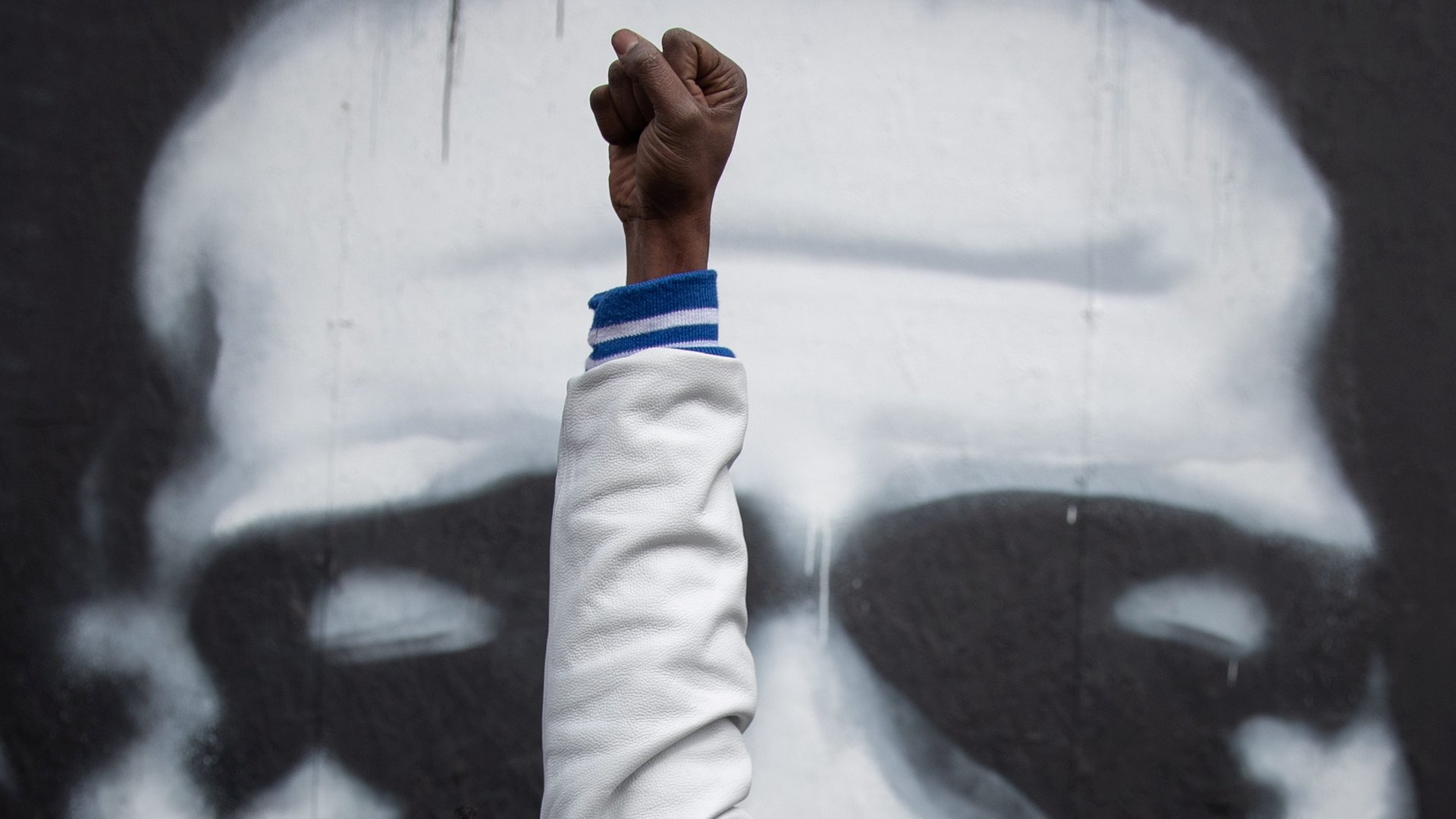Weekend edition—What we owe George Floyd, Covid’s true toll in India, opening the Arctic
Good morning Quartz readers,


Good morning Quartz readers,
One year ago this week, millions of people took to the streets, incited to action by the murder of George Floyd at the hands of a police officer. What followed was renewed—and justified—scrutiny of institutions like law enforcement and government, for how they perpetuate inequality and white supremacy.
The private sector, typically inclined to ignore such reckonings, was this time pressured to take a stand. Companies instituted external-facing initiatives and philanthropy to reflect their values and allyship. They turned inward, too, examining biased corporate cultures and accounting for systemic inequities. The national progression towards consciousness wasn’t linear—its backdrop has been a climate of violence against Black and Asian people—but it was promising.
So in the weeks leading up to this solemn anniversary, we wondered: What has really changed in the past year? Are the uncomfortable but important conversations sparked by Floyd’s death having an actual impact, still?
Quartz put that question to several business leaders, whose answers we published as a series of op-eds that make up our field guide this week. In them, a billionaire investor calls on corporations to donate 2% of their earnings towards initiatives that further racial equality. Nonprofit leaders talk about how companies can actually empower their chief diversity officers, and how they can make Asian-American and Pacific Islander employees feel safer at work. A venture capitalist takes aim at VCs’ lackluster efforts to support Black founders. Finally, two experts shine a spotlight on Minneapolis, where George Floyd was killed, to show how corporate commitments can make a difference at the local and national level.
As you read these pieces, we hope you’ll find encouragement and resolve in the blueprints for progress they provide. Looking ahead can help us see how much there is to do, but reflecting is just as important: It forces an assessment of how far we’ve really come. After the public pressure subsides and the chorus of calls for change quiets, it can be difficult to maintain a focus on racial equity. That’s the exact moment the work truly begins. —Alex Ossola, membership editor
Five things from Quartz we especially liked
The true scope of India’s Covid-19 crisis. Reporters at Sandesh, a newspaper in Indian prime minister Narendra Modi’s home state of Gujarat, conducted an informal census of hospitals and crematoriums and found daily pandemic death tolls that were 10 times higher than the officially reported figures. Ananya Bhattacharya and Amanda Shendruk show the data behind the story of the journalists uncovering the real numbers. —Nicolás Rivero, tech reporter
A decentralized way to resist. There are numerous examples of governments, authoritarian or not, tweaking or erasing history to achieve their purposes. In response, people are coming up with ever more innovative ways to fight back. Mary Hui talked to Kin Ko, the founder of LikeCoin, a decentralized publishing infrastructure that functions as a repository not of content, but of metadata. With the Hong Kong government exerting ever greater pressure on news media, platforms like LikeCoin could prove to be handy for those who refuse to forget. —Jane Li, tech reporter
News you can use. India’s internet is gradually heading in the direction of China’s, which makes now a good time for Hong Kong-based Jane Li to share tips with Quartz India journalists on circumventing authorities’ internet restrictions and avoiding the scrutiny of censors. This was a real-life newsroom chat that led to a useful primer for anyone—at least, anyone forced to adjust their digital life around a heavy-handed and social-media-obsessed central government. —Kira Bindrim, executive editor
Consultants have their day in court. Corporate courtroom battles can often be hard to follow. Sometimes, though, the crux of the fight boils down to a single question, the answer to which can be provided by a group of experts. In the Epic Games v. Apple case, that single question revolves around the size of the market in which Apple’s App Store operates. And who better to answer than consultants? Nicolás Rivero introduces us to the niche industry of antitrust experts. —Mary Hui, reporter
Nice work, and you can get it. All eyes are on the US job market and its supposed labor shortage, especially in the leisure and hospitality sectors. But it’s more complicated than that. In fact, jobs recovery has been speedier than during past recessions. With a comprehensive and chart-filled argument, Tim Fernholz reminds us that the labor market is a market. And as such, it is working just the way it should. —Amanda Shendruk, Things reporter
One membership thing that made us 😰
Melting ice across the Arctic will trigger a rush to control the resources, land, and shipping routes of the circumpolar north, which bodes ill for the planet’s climate. Let’s take a look by the digits:
8°C (46°F): Amount above average at which air temperatures on the coast of Russia’s Laptev Sea were measured in September 2020
25%: Volume of sea ice in the Arctic today compared to 40 years ago
4 million: People who live in the Arctic
90 billion: Barrels of oil thought to lie untapped in the Arctic, mostly offshore
4,000 km (2,500 miles): Length by which a Europe-Asia shipping trip using the Northwest Passage route is shorter than the southern route through the Panama Canal
$200,000: Approximate amount saved by taking the shorter distance
62: Full ship transits of the Northern Sea Route in 2020, up from 37 the year before
✦ The melting Arctic will open up new business opportunities, and new environmental risks. Our field guide on opening the Arctic explains what’s at stake. You’ll need a Quartz membership, but those stakes are low risk, high reward, especially when you try it free for a week, then take 50% off with code SUMMERSALE21.
We’re obsessed with cicadas

They didn’t ask to be this way. Periodical cicadas don’t damage plants, they don’t bite, they don’t spread disease, they feed a lot of other wildlife, and their exoskeletons decompose into nice tree fertilizer. Sure, their numbers are overwhelming, but they’re one of nature’s more spectacular reminders that the planet is still operational. If Brood X hadn’t made its entrance in the US this year, it would have been a truly terrifying sign. The Quartz Obsession will convince you to give cicadas a fair shake.
Get the Weekly Obsession email sent to your inbox, for free!
Five things from elsewhere that made us smarter
Remembering Tulsa. Before a 1921 pogrom destroyed over a thousand African-American homes and businesses, Tulsa’s Greenwood district was a flourishing business center, and a place of promise for Black people in Oklahoma. In an interactive, the New York Times reconstructs one block of what was nicknamed “Black Wall Street,” helping readers grasp the enormous impact the massacre had on the lives, and livelihoods, of the community it all but erased. —Annalisa Merelli, reporter
“If you’re not paying, you’re the product.” Like many hopeful vaccine hunters, I signed up for (and was disappointed by) Dr. B, a company that promised to match registrants with extra doses that otherwise would have been thrown away. Now that the usefulness of the free service has passed, what happens to all the data that it collected? While Dr. B claims it voluntarily follows HIPAA rules around privacy, its overly defensive response to MIT Technology Review’s Mia Sato’s questions is not exactly reassuring. —Liz Webber, deputy email editor
Dibs on vaccines. In India, however, health facilities offering free jabs are running out of supplies. Some Covid-19 vaccine shots are available for sale at private hospitals where they are being gobbled up by affluent citizens. As someone who has reported on India’s public health system, I found Amy Kazmin’s piece in the Financial Times sobering. For India’s poor, the public health system has always been a beacon in the fog. That’s no longer true. —Priyanka Vora, audience editor
The implications of dismantling Roe. In 1992, a US Supreme Court decision prohibited abortion bans prior to 24 weeks of pregnancy—thereby allowing the landmark 1973 Roe v. Wade decision to stand—but granted room for some state restrictions. Now, nearly 30 years later, the Court will again deliberate the standing of Roe in Dobbs v. Jackson Women’s Health Organization. For New York magazine, Ed Kilgore lays out in painstaking detail the current landscape of abortion rights, and the inequality in healthcare access this case has the potential to create. —Sudie Simmons, user insights manager
Uncivil society. The Citizen app is an experiment in using the smartphone panopticon to fight crime, but a recent episode where the company ginned up a city-wide manhunt for an innocent person shows the dangers of this intersection of social media and law enforcement. Vice reporters Joseph Cox and Jason Koebler gained access to Citizen’s internal communications and revealed a business model predicated on using fear and hysteria to drive users to pay more. —Tim Fernholz, senior reporter
Our best wishes for a relaxing but thought-filled weekend. Please send any news, comments, cicada pics, and responsible apps to [email protected]. Get the most out of Quartz by downloading our app and becoming a member. Today’s Weekend Brief was brought to you by Susan Howson.